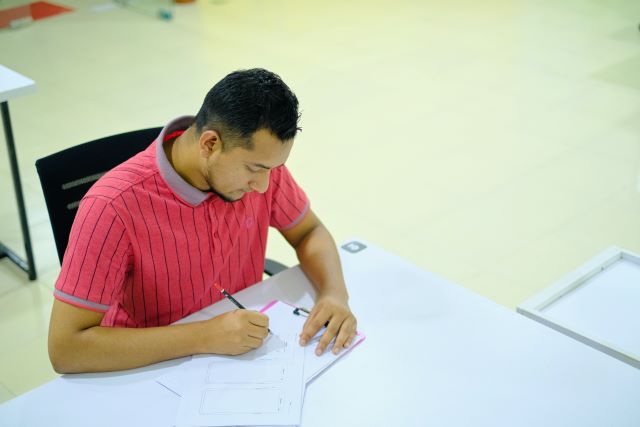Finishing Duolingo is a massive achievement, but you might wonder what you should be doing next to learn your language. There are several different directions you can take your language learning journey now that you have some extra skills from Duolingo. While Duolingo is good for giving you basic vocab and some grammatical sense, it’s not going to be the final piece in your learning journey. This article will give you some pointers for different areas you might consider looking into in order to enhance your language skills.
The first thing you should do though is celebrate! This is a massive achievement. However, you may not feel that you really know the language.
Duolingo should have given you the confidence to know if you wanted to continue with this language, or if you wanted to pursue a different language. In some ways, you can look at Duolingo as the “tutorial” of your language learning journey, and once you have completed the “tutorial”, it’s up to you to decide if you want to continue with that language, or not.
This article will give you some ideas for what you can do in the next stage of your language-learning journey.

Staying Consistent And Motivated After Finishing Duolingo
The biggest thing that you should do once you have completed Duolingo is to not stop. You’ve done a great job in completing the language course provided by Duolingo, and it can be really easy to get complacent afterward. Make sure that you are continually learning your language, in a consistent and sustainable way even after completing Duolingo.
Be aware that your motivation for learning the language may drop, as a part of you might have started to think that the goal was actually to complete Duolingo, rather than to learn the language. This is where that drop in motivation and consistency can come into play.
Don’t let the completion of Duolingo be your downfall in your language learning. Let it motivate you to keep going!
Hopefully, you have been creating your own flashcards using an app like Anki – more on this later. This will help you to continue learning the vocabulary that you have learned through Duolingo.
If you are a goal-orientated person, I recommend that you try to find some sort of language program or other activity that will help give you another goal that you can work towards. This will mean that although you have completed the Duolingo course, you will still retain that consistency and motivation in your language learning. Something that you could use in this regard is a language-learning app called Closemaster. You can find more information on the website here, however in essence this will allow you to learn words for your language in a much greater variety, and within a much broader range of contexts.

Testing Your Language Level After Finishing Duolingo
Something else that I would recommend for you to do when you have completed Duolingo (or before if you desire), is to find a language skill test for your particular language. I will list some of the possible places you can search for these tests below.
| Language | Organization | Link |
| German | Goethe Institute | https://www.goethe.de/en/spr/kup/tsd.html |
| Spanish | Cervantes Escuela Internacional | https://www.cervantes.to/test_inicial.html |
| Chinese | Transparent Langauge | https://www.transparent.com/learn-mandarin-chinese/proficiency-test.html |
| French | Strommen | https://strommeninc.com/language-tests/french-level-test/ |
| Hindi | Language Courses UK | https://www.languagecoursesuk.co.uk/leveltests/hindi_test.php?domain=fluk |
| Arabic | Arab Academy | https://www.arabacademy.com/test/ |
| Russian | MGU-Russian | https://mgu-russian.com/en/learn/test-online/ |
| Various | Cactus Language | https://www.cactuslanguage.com/language-level-tests/ |
Knowing your language level can be beneficial for several reasons. This will give you an idea of how much information Duolingo has actually given you for your new language, as well as how much of that information you have retained. If there are specific areas that you are lacking in, for example, reading or writing as well as grammatical concepts, you will be able to find ways to bridge those gaps.
The other benefit of undertaking a language learning test is for you to see how far you’ve come. it can be very rewarding, particularly if you have previously undergone a language test, to see your own progress. all the time and energy that you have put into the skill can now become a little bit more visible through this test.
The final way that this may benefit you is to help give you an indication of what you should do next. I will be giving some further information about this below, and some of the options I will be offering for you may make more or less sense depending on the results of your language test.
All that being said, I do want you to be aware that the result of that test is not the be-all and end-all of your language learning. This is particularly true if you vocabulary yourself. Your own vocabulary words are likely to be biased towards your own interests. These language skill tests are more tests to see what your all-around skills are in that language. This doesn’t mean that your skills are not good enough, or that the words that you are learning are not worth it. At the end of the day, you are learning this language for your own purposes and a language skills test is only so useful in giving information about your skills.

Enrolling In Language Learning Courses After Finishing Duolingo
While Duolingo helps give you the general basics, it may not fully suit your needs. While it is certainly helpful for starting your language learning journey, completion of Duolingo allows for alternative avenues for learning. For example, now that you’ve finished Duolingo, you’re in a much better space to consider if any sort of paid language learning approach might be more appropriate for you at this time.
There isn’t – in my opinion – much point starting your language learning journey with a paid course when you’re not even sure if you want to learn that language, or if you have the time to commit to learning at the pace of the course.
Now that you’ve completed Duolingo however, you know that by this point you like the language and want to continue it. You have a good base level of the language to be able to go into some courses and go deeper straight away. You can also consider some other options such as language tutors or language partners. By doing this, you will extend yourself a little bit more quickly and allow yourself to be able to push into areas that you want to learn.
If you’re unsure if language classes are the best fit for you, check out this extended post to get some further thoughts from me on this area.

How Reading Books And Media Will Help You Learn A Language After Finishing Duolingo
If you haven’t been already, now is a great time to start reading books and/or listening to podcasts or some other aural media, in your target language. Now that you have completed Duolingo, your language level should be at a point where you can start to actively use your language.
The good news here is that the type of media you consume can be entirely up to you. This means if you felt that Duolingo was not targeting your preferred topics, you can now search for those topics yourself. For example, I enjoy listening to the news and try to listen to it in German most mornings. There is a great news podcast that is dedicated to German language learners called “Langsam gesprochene Nachrichten”, which translates to “Slowly spoken news”.
Although this may be a little bit beyond just Duolingo’s vocabulary, if you are keeping up with the news in general, some of the words and topics may be familiar or comprehensible purely because you already know a little bit about the topic.
Another area of language learning that is classic for language learners is Anime. This is a huge topic in itself, however using some of the basic grammar that Duolingo teaches, as well as some of the vocabulary, you may be able to branch into some of your preferred Anime series and begin to learn some of the vocabulary to enjoy them in their native language.

How Using Grammar Books Will Help Your Language Learning
If you find that there are phrases and grammatical elements that are still a mystery to you when you are reading your books, I would recommend that you look for someone grammar books for your target language.
While this probably wasn’t a necessary learning material for you while you were just using Duolingo, you may find that it is quite useful to help supplement your learning as you go deeper into your language. Not everyone likes textbooks, so they may not be necessary for your language learning, but if you like to know how the language works, you will probably find them useful. More information on that here.
It doesn’t mean that you have purchase these books either: your local library probably has a large range of language books available for you to borrow.
There is a plethora of information about reading books as well as textbooks that can be found in other posts.
I also have a specific post for finding reading books in German, if that is the language you have been learning.

Why You Should Continue Using Duolingo After Finishing It
Duolingo is continually updating and improving itself. There are many more languages that are now available to learn compared to when I first started using Duolingo many years ago. For example, when I first started Duolingo, stories and podcasts did not even exist.
Continuing with Duolingo after you have already completed it may feel a bit odd. The reason I would recommend it is because there are more things to do in Duolingo than you may be aware of.
For example, did you know that there are podcasts?
Although these are not in every language that you can learn on Duolingo, I would not be surprised to see these coming out in the near future.
At time of writing, there are podcasts for English speakers learning Spanish and French, as well as podcasts for Spanish and Portuguese speakers who are learning English. One of the good things about using these podcasts, if you haven’t been already, is that they will incorporate words that you have been learning into real-life situations. This can really help to solidify your learning as you start to hear the words spoken in context.
Besides podcasts, there are also Duolingo stories. These stories will also help you focus on another skill in your language learning using words that you are learning from the Duolingo courses. Although there are more stories available, many of these are aimed at English learners rather than English speakers.
More lessons may be created for your language.
Make sure that you are checking in on your language course to see if there are any more lessons that have been added since you finished the course.
Although it may feel arduous to go back and complete more lessons throughout the course, especially after already completing it, this will be beneficial for you to continue your learning.

Why Using Duolingo Stories And Postcasts For Language Learning Helps
Another area that you can look into after using Duolingo – and something I would recommend doing even if you haven’t finished all of it – is to start creating flashcards using the words you are learning.
if you’re not sure what flashcard app you should use, I would recommend Anki.
Although I am sure that other flashcard apps could be used for creating flashcards, without a doubt, the app that I would recommend beyond any others is Anki. There are two great reasons for using Anki.
- Anki has a proven spaced-repetition system (SRS) that works for flashcards.
The purpose behind using flashcards is that as you revise your flashcards, the amount of time required between each revision increases as you get more familiar with the words. Being able to authentically use SRS in a way that makes sure you are revising the right cards at the right time and not wasting precious time looking at the wrong cards, is vital for any flashcard app. Anki pulls this off to the greatest level of success compared to any other app.
2. Anki is powerful.
On face value when you use Anki, it looks to be a fairly old-school style program. The flashcards themselves look, for lack of a better word, dated. However, Anki is powerful. There is a wide variety of flashcard types, stylization, add-ons, and other various bits and bobs that can be used to personalize the way that you use this program.
It is not just language learners who use this app: it is also highly popular among medical school students, as well as people who are simply wanting to learn, and retain more things.
I have written a lot more about Anki itself in other posts. If you’re still not convinced about the benefits of flashcards or Anki, check out this post.
If you want to create a lot of flashcards easily but you’re not quite sure how to do it (there is a way), this post will explain it to you.
For some general tips and advice on how to use Anki, perhaps for those people who have used it a little but want to see some extra features available in the app, this post can give you some answers.
If you’ve got some sort of text or exam coming up that you need to cram for, this post will also be beneficial.

How To Easily Turn Vocabulary From Duolingo Into Flashcards
To create flashcards using Duolingo, you could either create the flashcards, add words to your deck as you go.
Alternatively, there is actually an addon for Duolingo called “Pull From Duolingo”. This add-on allows you to pull words directly from Duolingo into your Anki deck, meaning that the words that you are adding to the deck are the words that you are actively learning.
This is really good because it means that even after you have finished learning on Duolingo and past all the lessons you can still be continually revising those words in Anki to make sure that they are not just learned once and then forgotten.

Other Methods To Increase Your Second Language Vocabulary
There are many alternate language learning methods that you can undertake. Now that you have completed Duolingo, these options are even wider than they were when you were a complete beginner. Below are some suggested methods to continue learning the language. There are also some extra tips for enhancing your language learning at home that can be found in other posts.
These might be particularly useful if you feel that you need a break from Duolingo, but still want to continue learning. When you are ready, I recommend that you revise some of the words on Duolingo, either in the app itself or using Anki, to make sure you don’t lose what you’ve spent so long learning.

Using Clozemaster To Improve Your Vocabulary
Along a similar vein of thinking to using the flashcard app Anki, is the suggestion to use the app called Clozemaster. If you haven’t heard of the word “cloze” before, imagine a fill-in-the-blank sentence, that is completely in your target language, and the missing word is for you to complete.
The benefit of Clozemaster, especially once you have a basic comprehension of the language, is that there are just so many words that it will throw at you to increase your vocabulary. Even more so it will talk to you so that you hear the words just to keep the pronunciation taking over when you see new words.
Now when I say that Clozemaster will give you more words to learn, I’m talking several thousand more words for your target language. Many of these words are much more nuanced and will give you the ability to speak more precisely.
Although it is not a bad idea to have started this before completing Duolingo, Duolingo will also give you the basics in grammar and vocabulary to help get you off the ground. One of the downsides of this app is that all of the sentences are in your target language so if you don’t know any words it will be quite tricky to start.
Luckily for you, you have finished Duolingo which means that you have a decent amount of words and vocabulary already in your toolbox ready to start practicing.
One method of language learning that I haven’t mentioned so far in this post is using Conversational AI for language learning. There’s a lot to be said for that, particularly as AI usage increases. The post above will help point you in the right direction to start considering if that’s something you would be interested in yourself.

Practising Two Foreign Languages Using Duolingo
If at some point you decide that you want to start learning a second foreign language, this method of learning may be for you! Duolingo has an option allowing you to choose your ‘native’ language. If you change your native language to the foreign language you know the most, you will find yourself practicing both of your languages at the same time!
For example, German is the language I have learned the most, so if I were to learn another language, such as French, I would set my native language in Duolingo to be German. Then, I would start a new course in French, using German as my ‘native’ language.
It can feel like a bit of a head spin to see the answers pop up in a language that also isn’t English, however, the practise that you will get is real.

How Foreign Language Partners Can Help Enhance Your Language Skills
The best way to learn a language is by speaking it. Although you might have had some practice doing this with Duolingo, now might be the time for you to consider looking at some sort of language partner with whom you can practice your language.
Because you have now got the basics of the language, you can start speaking to the native speaker and practicing the language. If the goal of your language learning journey was to use the language, this is a really good way to start. Of course, if you want to learn the language for other reasons perhaps you might think that a language partner isn’t quite needed, so think about your goals and time availability first.
There are a variety of platforms and methods that you can use to find a language partner. This can range from finding another beginner speaker in English so that you are both learning from each other and have roughly the same level of skill.
Alternatively, you might want to find a dedicated tutor for you, who you might pay to have conversations to help you improve your grammar and help you learn more about the country.
As a third option, consider looking for language social groups in your local area, as you might find that there are native speakers whom you can see face-to-face or other language learning enthusiasts who also speak your target language.
Sometimes it can feel hard to go from theoretical language learning to practical use of the language. Many of these platforms offer trials in some fashion which means that you won’t need to make a full commitment before trying it out to see what you think.
There is more information that can be found for using language tutors than can be said here. Check out the post here for more information on why language tutors might be useful for you.

Why Travelling To A Country Helps You Learn The Language
While a language tutor may not be something you’re interested in, I’m sure that everybody who is learning the language would want to travel to that country someday.
When that day comes, if you have used some of the suggestions that I have put above, you will find that speaking in a foreign language in a foreign country is easier than it seems and actually really enjoyable.
Of course, being in the country and surrounded by that language is the best way to learn. there are some languages on Duolingo for which this will be impossible, such as Dothraki and Latin. So while traveling to a country may not be suitable for everybody, if you can manage it, I would highly recommend that you take the opportunity where you can.
You can find more information about traveling to another country in this post here. Alternatively, if you are learning a language purely for traveling to a country as a short-stay tourist, you can find more ideas on language learning here.

Summary: What You Should Do After Finishing Duolingo
After you have finished Duolingo and celebrated this massive achievement, make sure to tell your family and friends as well. They may not quite understand the amount of time energy and thinking space that this took, but I hope that they are still proud of you.
As I mentioned earlier, now you can really start to branch out and ‘specialize’ into the area of your target language that you are really interested in. This is where the fun really begins.
Some of the suggestions that are in this post will help give you guidance for what you should do next in your language learning journey.
- Should Everyone In The World Speak A Universal Language?

- The Power of Immersing Yourself In A Language For Learning

- Start Your Language Learning Journey: Duolingo And Other Methods

- Does Learning A Language Help You Learn How Others Think

- Can You Learn a Language Without Learning Its Culture?

- Unlock Fluent Expression: Sentence Builders Across Languages

- Hidden Gems: Underrated Duolingo Languages Worth Learning

- The Ultimate German Pronunciation Guide

- Where To After Finishing Duolingo For Language Learning










